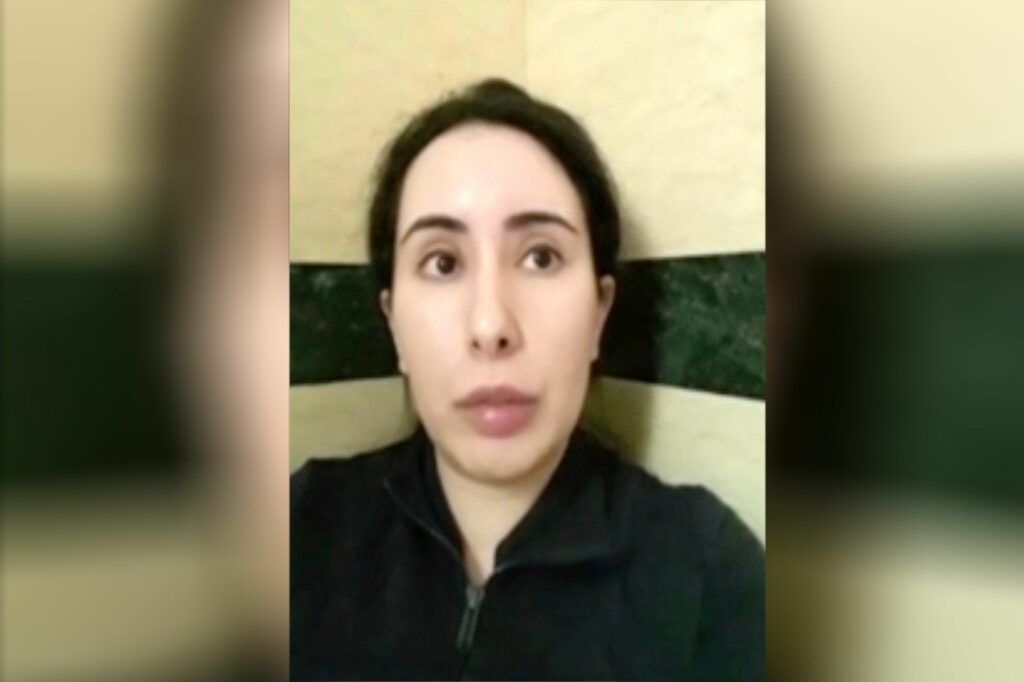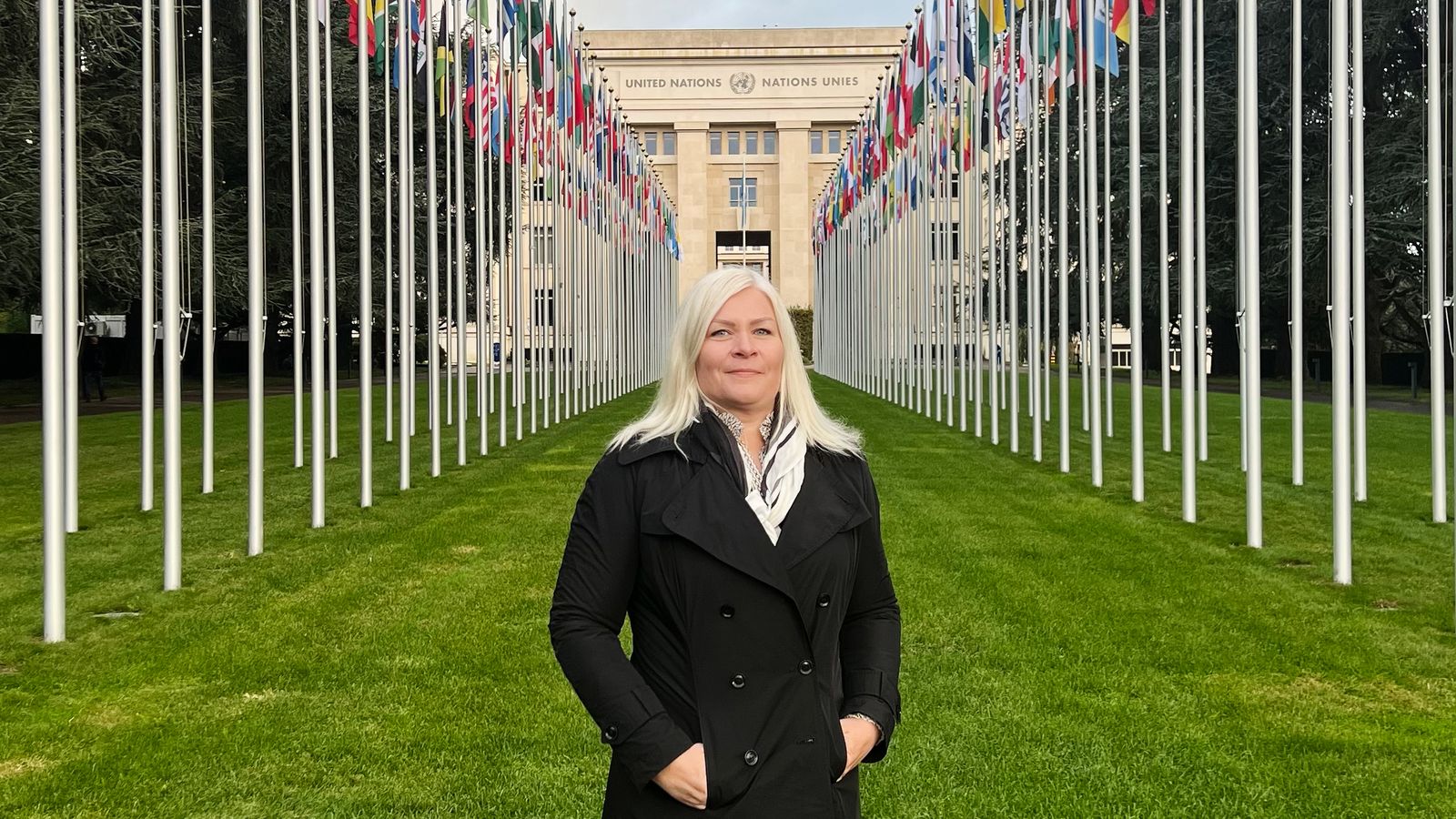“I should take my last breath – they would blow my brains out”
A Finnish woman wanted to help Princess Latifa escape Dubai. The plan failed and the two were arrested. Now Tiina Jauhiainen is reporting the Emir for torture – in Germany.
Alexandra Rojkov, Der Spiegel
November 4, 2022
The story of Tiina Jauhiainen sounds like a spy thriller: The Finn was working as a real estate agent in Dubai when she accidentally met Latifa al-Maktoum, the princess of the emirate, in 2010. The two became friends. In 2017, Latifa confided in her that she was under the control of her father, the Emir of Dubai, and was not allowed to leave the emirate. Jauhiainen and the princess then planned an adventurous escape – which failed. Security forces arrested the two on a ship off India. Jauhiainen was expelled after being detained in Dubai for several days. It is still unclear how Latifa is doing.
Now, more than four years after the escape attempt, Jauhiainen is making serious allegations against the Emir of Dubai and his security forces. The 46-year-old has filed a criminal complaint against torture and human rights violations with the Federal Public Prosecutor in Karlsruhe. Here she tells why she is reporting the men in Germany of all places, and what allegedly happened to her.
SPIEGEL: Ms. Jauhiainen, you accuse the Emir of Dubai Mohammed bin Rashid al-Maktoum and Ahmed Naser al-Raisi, the former inspector general at the Interior Ministry and today’s Interpol boss, of torture, among other things. Your security forces are said to have threatened you with death in Dubai in 2018, kept you in a windowless room for days and interrogated you for up to 18 hours a day. How did you come to file a complaint?
The person
Tiina Jauhiainen, 46, met
Princess Latifa in Dubai and
helped her escape in 2018. For
years, Jauhiainen led a campaign
for her friend’s release. The Finn
now lives in London.
Tiina Jauhiainen: I fought for my friend Latifa’s freedom for years. Now I feel like it’s time to talk about what happened to me. After our escape attempt, I was mentally and physically tortured by the Emirates security forces. (Editor’s note: Neither the head of Interpol nor the embassy of the United Arab Emirates in Berlin responded to a question from SPIEGEL about the allegations.) So far I have done nothing to get justice. I wanted to change that.
SPIEGEL: The escape attempt and the alleged torture were more than four years ago. Why did you only decide now to file a complaint?
Jauhiainen: Fighting for Latifa took all my energy. Our campaign for her release ended a year ago – this gave me the space to reflect on my own experiences. Now is the right time to report.
Many of the perpetrators travel to Germany regularly. It would be easier to detain and question them there than in other states.
SPIEGEL: You are Finnish and live in London . The alleged crimes took place in Dubai or in international waters. Then why are you turning to the German Attorney General?
Jauhiainen: My lawyers thought Germany was the best place. You explained to me that a kind of »universal legal principle« applies in Germany, which means that crimes that have nothing to do with the country can also be prosecuted. And many of the perpetrators regularly travel to Germany. So it would be easier to detain and question them there than in other states.
SPIEGEL: How did you meet the princess?
Jauhiainen: In 2010 I was living in Dubai and working in the real estate industry. I also trained in the Brazilian martial arts of Capoeira, a hobby. Then I got a request if I would be willing to give private lessons in it. It wasn’t until I met Latifa at a class that I understood who she was.
SPIEGEL: They became close friends.
Jauhiainen: Yes. First we met after my work for training, then we also did other things together. Once she invited me to a vegan cooking class, later we often went skydiving together.
SPIEGEL: When did Latifa tell you that her father was holding her?
Jauhiainen: That was in 2017, years after we first met. She first told me about her sister Shamsa, who tried to escape in 2000. She fled while on holiday in the UK , but was found by the Emir’s security and taken back to Dubai. Latifa said she tried to help Shamsa and was held captive by her father for more than three years. I was shocked.

SPIEGEL: Had she never spoken about it before?
Jauhiainen: No. It was a dark family secret. I think Latifa only ever told two or three people about it.
SPIEGEL: When did you decide to help Latifa attempt to escape?
Jauhiainen: She asked me for help in 2017. She wanted to be free, to lead a normal life. In the beginning I saw the escape as a great adventure that we would face together. It was only over time that I realized how risky it all was.
On the evening of March 4, 2018, Latifa and I were in our cabin when we suddenly heard heavy footsteps overhead – and then gunshots.
SPIEGEL: You prepared the escape for months, got the equipment and found people who could help you.
Jauhiainen: On February 24, 2018 the time had come. Latifa and I drove to Oman. In Muscat, the capital, I had organized a dinghy that was waiting for us. The weather was bad, there was a storm warning, but we couldn’t postpone the escape. After about 20 kilometers someone with jet skis welcomed us. Another three to five hours later a ship was waiting for us in international waters.
SPIEGEL: You tried to reach India – but your boat was stopped after eight days.
Jauhiainen: We were concerned beforehand: Search and rescue planes kept flying low over us. On the evening of March 4, 2018, Latifa and I were in our cabin when we suddenly heard heavy footsteps overhead – and then gunshots. Suddenly the room filled with smoke, someone must have thrown a flashbang into it. We had no choice but to exit the cabin. When I climbed the stairs to the deck, everything was so smoky that I couldn’t see anything. All I saw were lasers—probably from guns—pointed at my head.
I was told no one knew I was in that prison. I would never see my family again and I would die here.
SPIEGEL: What happened then?
Jauhiainen: I was pushed to the ground, someone tied my hands behind my back. As soon as I moved, they threatened to shoot me. Later someone leaned me over the railing, pushed my head towards the water and told me to take my last breath – they were about to blow my brains out. I don’t know how much time passed like that. Just watching my life pass me by.
SPIEGEL: What were you thinking at that moment?
Jauhiainen: I couldn’t think straight, everything was blurry. When something like this happens, it is beyond imagination. But at some point I was pulled over the parapet again and taken to the back of the boat, where Latifa was too.
SPIEGEL: What happened to Latifa?
Jauhiainen: They took her away, I didn’t see her again. I was taken back to Dubai separately. On the way, the head of operations told me that I had done something very stupid for standing in the way of the ruler of Dubai. I should consider jumping overboard and drowning voluntarily, because what awaits me in Dubai is much worse.
SPIEGEL: What happened next?
Jauhiainen: After we reached Dubai, I was blindfolded and taken to a prison. For the next three or four days – I can’t say exactly because I didn’t have a watch – I was interrogated almost continuously. They kept asking me who was really behind the escape plan: they didn’t want to believe that Latifa had asked me for help myself. That I just wanted to help a friend.
SPIEGEL: You say that you were also threatened during the interrogation.
Jauhiainen: I was told that nobody knew I was in this prison. I would never see my family again and die here. I was so tired from the interrogations that I fell asleep on the tabletop. Sometimes they took me to my cell, but it was freezing there. The room had no window, I was completely alone. All I heard was the call to prayer.
SPIEGEL: While you were in prison, Latifa’s attempt to escape made international headlines.
Jauhiainen: Yes, but I didn’t know that. I just noticed that the tone of the interrogators changed at some point. Suddenly it was said that the Sheik would forgive me. I was made to videotape a confession and had to sign Arabic papers that I didn’t understand. After I had also assured in writing that I would not speak publicly about my treatment, I was released.
I’ve decided that the men who did this shouldn’t get away with it.
SPIEGEL: You say the security guards threatened you at the airport.
Jauhiainen: Yes. I was told that I “had been given a second chance” and that I should “not ruin it.” Someone mentioned Princess Diana and that her death was not an accident. (Editor’s note: Princess Diana died in a car accident in Paris in 1997.) It was an implicit warning: if I told what happened in Dubai, something would happen to me.
SPIEGEL: You still speak publicly about the escape attempt and what you experienced. Why?
Jauhiainen: I started campaigning for Latifa’s freedom as soon as I returned to Europe . That was important to me, she was my best friend! And I also felt that being public was protecting me. If I had kept my mouth shut, they could have made me disappear without anyone noticing.

SPIEGEL: How did the experience change you?
Jauhiainen: I had trouble sleeping for a while, but that’s not surprising after what happened. I once had a panic attack while visiting Edinburgh Castle with my niece – the dungeon reminded me of my own imprisonment. But I’ve also become more resilient. I could keep quiet, but I’ve decided that the men who did this shouldn’t get away with it. Otherwise they will go on and do the same to others.
SPIEGEL: Last year, the BBC published a video in which Princess Latifa said she was her father’s hostage and apparently hadn’t left the house for months. Some time later, photos of the princess appeared in Iceland and in Paris. Do you know how Latifa is now and if she’s free?
Jauhiainen: We are not in contact and I don’t want to speculate on how she is doing. But I can say that Latifa’s lawyers have asked me and other supporters to end our campaign for her release. This would not have happened without Latifa’s consent and I respect that wish. Now it’s time to deal with what was done to me.
SPIEGEL: What success do you expect for your criminal complaint? It is unlikely that German courts will actually convict the Emir of Dubai of torture.
Jauhiainen: I don’t think so far. It would be a win for me if the investigations against the men were opened. Then I would have done whatever I can to get justice.
